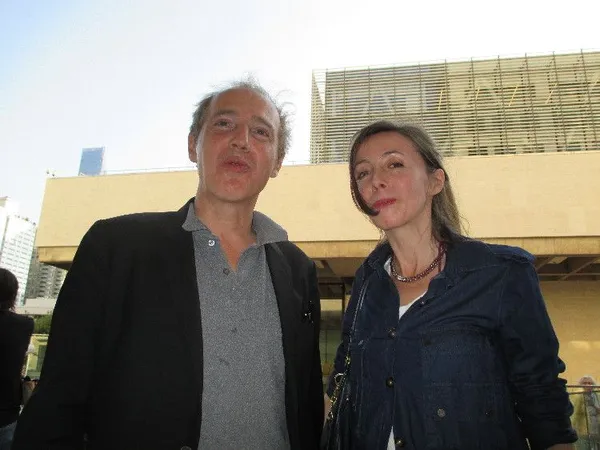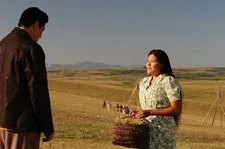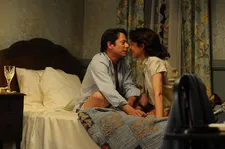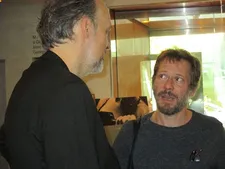 |
| A "Touch Of Evil" with Arnaud Desplechin and Anne-Katrin Titze through the lens of Kent Jones. |
I met up with Arnaud Desplechin to discuss his latest film screened at the New York Film Festival and discovered masculinity in Hitchcock's Vertigo by letting Kim Novak die and the soul of a Russian doll while sounding like Danny Kaye in The Court Jester. We were photographed with just a touch of evil by co-screenwriter Kent Jones and tried to find out what it actually means to "become an American."
In Jimmy P: Psychotherapy Of A Plains Indian, based on the case study 'Reality and Dream' by ethnologist and psychoanalyst Georges Devereux, nationalities and accents blur to bring light, while Devereux (Mathieu Amalric in fire and fervor) and his patient Jimmy Picard, a Native American war veteran played with internal radiance by Benicio Del Toro embark on mapping out disclosures of the mind.
Anne-Katrin Titze: This morning I saw Arthur Ripley's The Chase and thought how well the subject matter fits with your film. The war veteran, the atmosphere, and the time vaguely. Because of the restoration I felt a bit like an audience member in 1946, or imagined it.
 |
| Georges Devereux with Jimmy P: "And Jimmy says he is thinking of the shipyards." |
Arnaud Desplechin: Yes, I can see it. We didn't work that much with this film. Two films inspired us a lot. John Huston's Let There Be Light, [his suppressed 40mm film shot for the army in 1945 about returning soldiers]. The other was The Exiles (1961), Kent Mackenzie's movie about Native American guys and girls living in Los Angeles in the late 50s. It was so important for me that you could see Native American characters before the big native movement of the Sixties. What I mean is assimilated Native Americans, there was nothing like going back to your roots or going back to the reservation. It's this foolish hope to become American at last. It's a portrait of uprooted guys around Los Angeles. It's a wonderful film. I know that the film has been a great inspiration for Benicio [Del Toro], too.
AKT: What you just said about the 'foolish hope of becoming American' is a big issue in your film. A dream that comes with the question: what is it to become an American?
AD: Yes, for me, becoming an American would be to invent himself. I would become an American if I would be not myself. The film is the portrait of two guys who are in exile. Two exiles, one from Europe, and the other being an exile in his own country, as a Native American. The two of them, for different reasons, want to become American. I love the scene with Jimmy and the girl and she is asking 'will you be going back to the res[ervation]?' And Jimmy says he is thinking of the shipyards. After the cure and the book, Jimmy didn't go back to the reservation. He worked here and there and traveled across the US.
AKT: Also the idea of the US is tied to reinvention and the movies. Your film's most prominent female character not coincidentally is called Madeleine (Gina McKee) and she arrives wearing a grey suit at the train station in Topeka. I love how her grey suit is the same exact grey Mathieu Amalric's [Georges] Devereux has on. He has a red tie and she has the handbag in the same burgundy shade.
 |
| Benicio Del Toro as Jimmy P with Misty Upham as Jane: "Jimmy didn't go back to the reservation." |
AD: I was working with David C. Robinson who is such a wonderful costume designer. The grey suit from Vertigo obviously was an inspiration for the way they are dressed.
AKT: In Vertigo Jimmy [Stewart] S. attempts to resurrect Madeleine [Kim Novak] in the grey suit. Here, the married girlfriend and Devereux reinvent each other?
AD: In my mind, in the writing process it became clear that Madeleine is not too keen on reinventing herself. She is claiming the facts - "I am a married woman. I don't like to pretend that I am somebody else. I'm not disguising myself." Devereux is disguising himself. He wants to become an American, she's going back to Europe. So in some way I'm closer to Madeleine than Devereux. She would be me in the film. I would be closer to Madeleine's position in the film.
AKT: She has a great scene with the Russian dolls. Did you make up the explanation she gives? How did it go? The soul is in the mind? The mind is...
AD: I am sure you can find it on the DVD.
We start to sound like Danny Kaye in The Court Jester: "The pellet with the poison is in the vessel with the pestle…"
AD: I think it is the soul is in the mind. The mind is in the heart. The heart in the body and the body in the person. This was not in the book.
AKT: How did Kent Jones get involved in writing the screenplay with you?
 |
| Mathieu Amalric as Georges Devereux with Gina McKee as Madeleine: "it became clear that Madeleine is not too keen on reinventing herself." |
AD: I knew I didn't want to translate the script. I wanted to adapt it for America. I did a great job with a French co-writer Julie [Peyr]. So when I had an unfinished version, a first draft of the script, I sent it to Kent with a question mark. I had three names of writers I could work with, and I sent these names together with the rough draft, knowing that I would spend a few months working on this script with an American writer. I sent it to Kent, and I didn't have an answer to my e-mail for two days or something like that. Are we still friends? What's happening? I needed an answer. Then I got a short note from Kent saying 'perhaps you will never forgive me, but I had to do that.' As a file attached there was the rough draft with all his corrections about the American dialogues. So I thought, perhaps this is a proposition - perhaps Kent is proposing why hire these writers and why not hire me? So I came to New York and we worked on the script, finished the script together, the construction of it. And then we worked with Benicio on the script in Los Angeles. It was wonderful. After that I had all these notes and we had a long session in New York with Benicio, Mathieu, and Kent. We were not writing the script, but adapting the script for the actors.
AKT: There is a line in the film: "I've always been a man who let a woman die."
AD: That's not coming from the book.
AKT: Is it coming from you?
AD: I'm afraid so. Yes.
AKT: But you're Madeleine. So you're safe?
 |
| Co-screenwriter Kent Jones with Mathieu Amalric: "we had a long session in New York with Benicio, Mathieu, and Kent." Photo: Anne-Katrin Titze |
AD: Madeleine is only one mask that I'm using. I can use other masks. Since a while, I've had this idea that on screen, through film that I never had through literature or painting, the idea that maybe becoming a man is when you realise that you let a woman die and that you have been unable to save her. Like the character in Vertigo, I tried to save her but I was not able to save her. It can be your sister it can be a child, it doesn't have to die, it can be your mother, grandmother, friend of your grandmother, some girl in school that you ignored, you have not cared to send for her and to save her. So you failed. And because you failed it explains something about your manhood, about the fact of being a male. It seems to me that on screen what you can discover in the Hitchcock movies that what makes you a woman in an odd way is that you are guilty because you killed a man before. You always killed a man before. It can be your father that you didn't like enough. It can be a guy in school where you had mean words for him, something like that. So the fact that the woman can extend the guilt and the fact that the man can extend the impotency makes them woman or man on screen. Sorry about that - it's so abstract.
AKT: Not at all. You make the concept very clear.
In part 2, Arnaud Desplechin discusses Mathieu Amalric's approach to his character Georges Devereux and how it differed from Benicio Del Toro with Jimmy P, Dr. Karl Augustus Menninger, Kings and Queen with Emmanuelle Devos, Henry Fonda in Young Mr.Lincoln, and a Thomas Hardy kind of feeling.





















